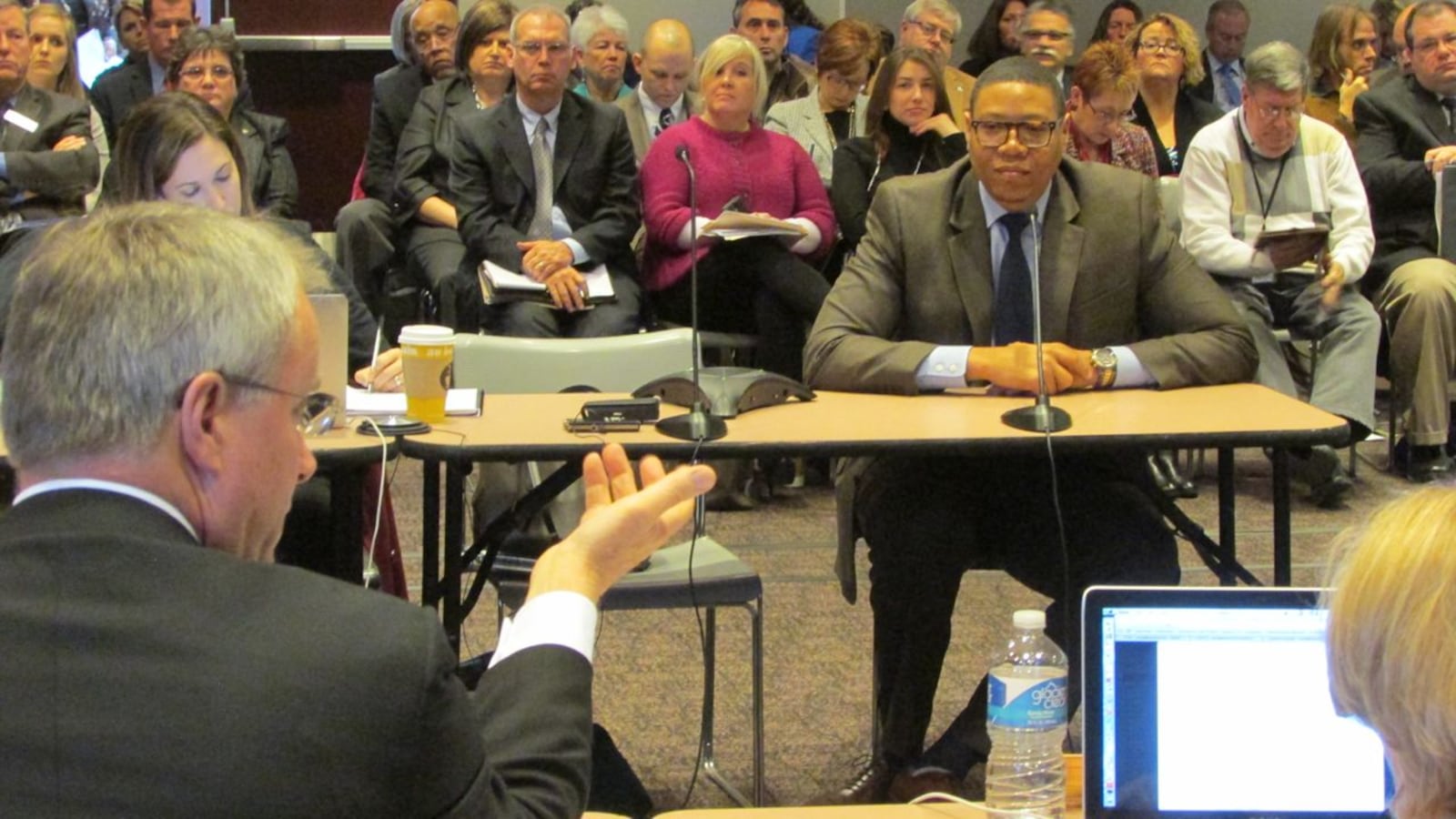The Indiana State Board of Education today unanimously voted to let Indianapolis Public Schools manage Arlington High School, but the school will remain in state takeover.
The decision is the latest in a confusing string of actions by the state board over who controls the school, which was severed from district control in 2012 because of low test scores. A deal with charter operator Tindley Accelerated Schools to manage Arlington in state takeover fell apart last year because of cost concerns.
In the last few months, IPS thought Arlington had exited state takeover and been returned to the district, learned that the state board expected to keep the takeover in force and, finally, forged today’s agreement for the district to manage the school again but with the state board still ultimately in charge.
In December, IPS Superintendent Lewis Ferebee hailed a state board vote he said gave IPS back complete control over the school. But in February, state board members said they weren’t ready to relinquish control. The confusion raised concerns among state policymakers and schools that there is no clear path yet on how a school can exit state takeover.
Today, board members referred to IPS as the school’s “manager.”
“You can start telling the community that IPS is going to run this thing,” board member Dan Elsener said.
The deal is contingent on IPS by April 1 entering into a contract with an outside consultant to help improve the school and agreeing to meet data goals that haven’t yet been set.
Elsener said the ultimate goal of state takeover is to give control of the school back to the district. But he said he wants IPS to show marked improvement at the school before that happens.
“We want it right back where it belongs,” Elsener said.
The IPS school board is set to vote next week on a contract with Boston-based Mass Insight, the likely consultant for the school. Arlington will eventually be part of a transformation zone, a turnaround strategy that involves grouping schools and identifying struggling students early.
The strategy has worked in Evansville and state board members said they believe it’s how school turnaround should be handled in the future.
“I’m willing to vote in favor of the concept because I think that’s where we need to be going with all these turnaround schools,” said board member Tony Walker, who said he hoped a similar plan would eventually be put in place at Roosevelt High School in Gary.
Ferebee said afterward he came away from the meeting with more clarity, but he said told board members that the process has been “frustrating.” IPS is soon to select a principal for the school, and Ferebee said the district has found $6.5 million in repairs and technology updates it needs to make before it reopens next year.
“We know what we’re expected to bring forth and we’re going to do that,” Ferebee said. “Our role is to identify a great leader, build a team to support the students there and engage the community to improve student outcomes.”
Merging John Marshall High School into Arlington — a controversial idea Ferebee suggested to the state board in October — is no longer being considered, he said. IPS board members and Ferebee initially said they favored merging John Marshall at Arlington, but a meeting at the high school brought several speakers who opposed that plan.
“Part of the input and feedback process was to listen and take that information to inform our decision and we heard a lot of concern around that and it’s something we want to be sensitive to,” Ferebee said.
Plus, he said, starting with a relatively small student population might produce better results. Arlington’s projected enrollment for next fall is 607 students, but most of those will be new seventh graders from nearby elementary schools.
Enrollment at Arlington dropped sharply when Tindley Schools took over from IPS. Its enrollment of nearly 1,200 before the takeover in 2012 dropped to 317 students last year.
“This is almost like a restart,” Ferebee said. “We want to make sure we create a very strong foundation. It may not be the right time to implement a merger when we’ve got that type of work that needs to take place.”
No deal yet on Emma Donnan
Indianapolis Public Schools and Charter Schools USA still haven’t reached a deal to partner on Emma Donnan Middle School, which was handed over to CSUSA in 2012 in state takeover.
The parties have said they want to work together to create an elementary school that feeds into Emma Donnan, which serves grades 7 and 8, under a new state law signed last year that allows compacts between the district and charter school groups. But the company and the district are still hashing through details about how it would work with their lawyers.
State board members urged IPS and CSUSA to have a deal by the April 1 meeting.
“I can tell you we continue to poke, prod and encourage them to move forward,” said Bob Guffin, the state board’s executive director, “and they have made great strides in what they’re doing.”

